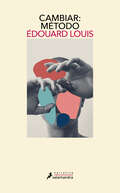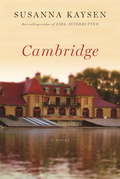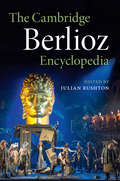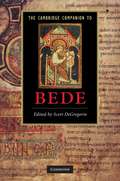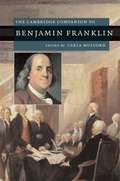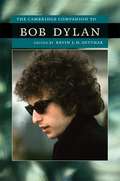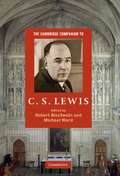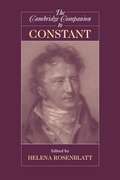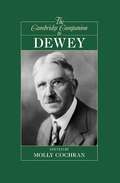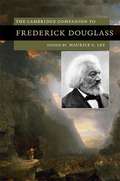- Table View
- List View
Cambiar: método
by Édouard LouisUna historia de aprendizaje y metamorfosis sobre cómo cambiar de identidad. Casi una década después de Para acabar con Eddy Bellegueule, su ópera prima, que se convirtió en un sorprendente fenómeno internacional, Édouard Louis regresa con un nuevo texto autobiográfico que nos permite medir el alcance del camino recorrido desde una infancia marcada por la miseria económica, moral y cultural hasta la vida adulta en los elegantes barrios de París. Una fascinante y conmovedora historia de aprendizaje y metamorfosis para escapar de la pobreza, la violencia y la exclusión. Dotado de una trágica lucidez y de una franqueza asombrosa, Cambiar: método es probablemente el libro más tierno y melancólico de Édouard Louis, una forma de odisea personal que no es sino el fruto maduro de una permanente, insaciable y terapéutica búsqueda de la felicidad. Reseñas:«Un Édouard Louis más literario que nunca. [...] Un libro que expresa, en un estilo más narrativo, cómo el autor se vengó de su pasado, cómo los encuentros y las casualidades de la vida lo llevaron a mirarse a sí mismo. Fascinante».FranceInter «Después de haber escrito sobre todo para salvarse y existir, Édouard Louis alienta un proyecto literario híbrido, entre el activismo y la autoficción, que consiste en escribir libros que sean armas para otros».Le Devoir «El libro más poderoso, delicado y emotivo de Édouard Louis».Femme Actuelle «Un autor que tiene más recuerdos que si tuviera mil años».Le Monde
Cambridge
by Susanna Kaysen"It was probably because I was so often taken away from Cambridge when I was young that I loved it as much as I did . . ." So begins this novel-from-life by the best-selling author of Girl, Interrupted, an exploration of memory and nostalgia set in the 1950s among the academics and artists of Cambridge, Massachusetts. London, Florence, Athens: Susanna, the precocious narrator of Cambridge, would rather be home than in any of these places. Uprooted from the streets around Harvard Square, she feels lost and excluded in all the locations to which her father's career takes the family. She comes home with relief--but soon enough wonders if outsiderness may be her permanent condition. Written with a sharp eye for the pretensions--and charms--of the intellectual classes, Cambridge captures the mores of an era now past, the ordinary lives of extraordinary people in a singular part of America, and the delights, fears, and longings of childhood.From the Hardcover edition.of childhood, the mores of an era now past, the ordinary lives of extraordinary people in a singular part of America, and the ways we can-and cannot-go home.
The Cambridge Berlioz Encyclopedia
by Julian RushtonWith over forty international specialist authors, this Encyclopedia covers all aspects of the life and work of Hector Berlioz. One of the most original composers of the nineteenth century, he was also internationally known as a pioneer of modern conducting, and as an entertaining author of memoirs, fiction, and criticism. His musical reputation has fluctuated, partly because his works rarely fit into conventional categories. As this Encyclopedia demonstrates, however, his influence on other composers, through his music and his orchestration treatise, was considerable, and extended into the twentieth century. The volume also covers Berlioz's connections with government officials and Paris concert societies and theatres, and contains information on his wide social circle including important literary figures. The Encyclopedia explores his fascination with foreign authors such as Shakespeare, Moore, and Goethe, and treats fully his promotion of his own and others' music, often at his own financial risk.
Cambridge Classical Studies: M. I. Finley
by Daniel Jew Robin Osborne Michael ScottM. I. Finley (1912-86) was the most famous ancient historian of his generation. He was admired by his peers, and was Professor of Ancient History at the University of Cambridge and Fellow of the British Academy. His unmistakable voice was familiar to tens of thousands of radio listeners, his polemical reviews and other journalism were found all over the broadsheets and weeklies, and his scholarly as well as his popular works sold in very large numbers as Penguin paperbacks. Yet this was also a man dismissed from his job at Rutgers University when he refused to answer the question of whether he was or had ever been a member of the Communist Party. This pioneering volume assesses Finley's achievements and analyses the nature of the impact of this charismatic individual and the means by which he changed the world of ancient history.
The Cambridge Companion to Abelard
by Jeffrey E. Brower Kevin GuilfoyPeter Abelard (1079–1142) is one of the greatest philosophers of the medieval period. Although best known for his views about universals and his dramatic love affair with Heloise, he made a number of important contributions in metaphysics, logic, philosophy of language, mind and cognition, philosophical theology, ethics, and literature. The essays in this 2004 volume survey the entire range of Abelard's thought, and examine his overall achievement in its intellectual and historical context. They also trace Abelard's influence on later thought and his relevance to philosophical debates today.
The Cambridge Companion to Abraham Lincoln
by Shirley SamuelsAbraham Lincoln's stature as an American cultural figure grows from his political legacy. In today's milieu, the speeches he delivered as the sixteenth president of the United States have become synonymous with American progress, values, and exceptionalism. But what makes Lincoln's language so effective? Highlighting matters of style, affect, nationalism, and history in nineteenth-century America, this collection examines the rhetorical power of Lincoln's prose from the earliest legal decision, stump speeches, anecdotes, and letters to the Gettysburg Address and the lingering power of the Second Inaugural Address. Through careful analysis of his correspondence with Civil War generals and his early poetry, the contributors, all literary critics, give readers a unique look into Lincoln's private life. Their essays also examine Lincoln's language in a larger sphere, including that of the Caribbean and Latin America, as well as Europe. Such a collection enables teachers, students, and readers of American history to assess the impact of this extraordinary writer and rare politician on the world's stage.
The Cambridge Companion to American Women Playwrights
by Brenda MurphyThis volume addresses the work of women playwrights throughout the history of the American theater, from the early pioneers to contemporary feminists. Each chapter introduces the reader to the work of one or more playwrights, covering significant writers such as Rachel Crothers, Susan Glaspell, Lillian Hellman, Sophie Treadwell, Lorraine Hansberry, Alice Childress, Megan Terry, Ntozake Shange, Adrienne Kennedy, Wendy Wasserstein, Marsha Norman, Beth Henley and Maria Irene Fornes, in the context of topics such as early comedy and melodrama, feminism and realism, the Harlem Renaissance and feminism.
The Cambridge Companion to Anselm
by Brian Davies Brian LeftowAnselm of Canterbury (1033–1109), Benedictine monk and the second Norman archbishop of Canterbury, is regarded as one of the most important philosophers and theologians of the Middle Ages. The essays in this volume explore all of his major ideas both philosophical and theological, including his teachings on faith and reason, God's existence and nature, logic, freedom, truth, ethics, and key Christian doctrines. There is also discussion of his life, the sources of his thought, and his influence on other thinkers. New readers will find this the most convenient, accessible guide to Anselm currently available. Advanced students and specialists will find a conspectus of developments in the interpretation of Anselm.
The Cambridge Companion to AUGUSTINE
by David Vincent Meconi Eleonore StumpIt has been over a decade since the first edition of The Cambridge Companion to Augustine was published. In that time, reflection on Augustine's life and labors has continued to bear much fruit: significant new studies into major aspects of his thinking have appeared, as well as studies of his life and times and new translations of his work. This new edition of the Companion, which replaces the earlier volume, has eleven new chapters, revised versions of others, and a comprehensive updated bibliography. It will furnish students and scholars of Augustine with a rich resource on a philosopher whose work continues to inspire discussion and debate.
The Cambridge Companion to Augustine
by Eleonore Stump Norman KretzmannIt is hard to overestimate the importance of the work of Augustine of Hippo and its influence, both in his own period and in the subsequent history of Western philosophy. Many of his views, including his theory of the just war, his account of time and eternity, his attempted resolution of the problem of evil, and his approach to the relation of faith and reason, have continued to be influential up to the present. In this volume of specially-commissioned essays, sixteen scholars provide a wide-ranging and stimulating contribution to our understanding of Augustine.
The Cambridge Companion to Bacon
by Markku PeltonenFrancis Bacon (1561-1626) is one of the most important figures of the early modern era. His plan for scientific reform played a central role in the birth of the new science. The essays in this volume offer a comprehensive survey of his writings on science, including his classifications of sciences, his theory of knowledge and of forms, his speculative philosophy, his idea of cooperative scientific research, and the providential aspects of Baconian science. There are also essays on Bacon's theory of rhetoric and history as well as on his moral and political philosophy and on his legacy.
The Cambridge Companion to Bede
by Scott DegregorioAs the major writer and thinker of the Anglo-Saxon period, the Venerable Bede is a key figure in the study of the literature and thought of this time. This Companion, written by an international team of specialists, is a key introductory guide to Bede, his writings, and his world. The first part of the volume focuses on Bede's cultural and intellectual milieu, covering his life, the secular-political contexts of his day, the foundations of the Latin learning he inherited and sought to perpetuate, the ecclesiastical and monastic setting of early Northumbria, and the foundation of his home institution, Wearmouth-Jarrow. The book then considers Bede's writing in detail, treating his educational, exegetical and historical works. Concluding with a detailed assessment of Bede's influence and reception from the time of his death up to the modern age, the Companion enables the reader to view Bede's writings within a wider cultural context.
The Cambridge Companion to Ben Jonson
by Richard Harp Stanley StewartBen Jonson is, in many ways, the figure of greatest centrality to literary study of the Elizabethan and Jacobean period. He wrote in virtually every literary genre: in drama, comedy, tragedy and masque; in poetry, epigram, epistle and lyric; in prose, literary criticism and English grammar. He became the most visible poet of his age, honored more than even William Shakespeare, and his dramatic works, in particular his major comedies, continue to be performed today. This Companion brings together leading scholars from both sides of the Atlantic to provide an accessible and up-to-date introduction to Jonson's life and works. It represents an invaluable guide to current critical perspectives, providing generous coverage not only of his plays but also his non-dramatic works. The volume is informed by the latest development in Jonson scholarship and will therefore appeal to scholars and teachers as well as newcomers to his work.
The Cambridge Companion to Benjamin Franklin
by Carla MulfordComprehensive and accessible, this Companion addresses several well-known themes in the study of Franklin and his writings, while also showing Franklin in conversation with his British and European counterparts in science, philosophy, and social theory. Specially commissioned chapters, written by scholars well-known in their respective fields, examine Franklin's writings and his life with a new sophistication, placing Franklin in his cultural milieu while revealing the complexities of his intellectual, literary, social, and political views. Individual chapters take up several traditional topics, such as Franklin and the American dream, Franklin and capitalism, and Franklin's views of American national character. Other chapters delve into Franklin's library and his philosophical views on morality, religion, science, and the Enlightenment and explore his continuing influence in American culture. This Companion will be essential reading for students and scholars of American literature, history and culture.
The Cambridge Companion to Bob Dylan
by Kevin J. H. DettmarA towering figure in American culture and a global twentieth-century icon, Bob Dylan has been at the centre of American life for over forty years. The Cambridge Companion to Bob Dylan brings fresh insights into the imposing range of Dylan's creative output. The first Part approaches Dylan's output thematically, tracing the evolution of Dylan's writing and his engagement with American popular music, religion, politics, fame, and his work as a songwriter and performer. Essays in Part II analyse his landmark albums to examine the consummate artistry of Dylan's most accomplished studio releases. As a writer Dylan has courageously chronicled and interpreted many of the cultural upheavals in America since World War II. This book will be invaluable both as a guide for students of Dylan and twentieth-century culture, and for his fans, providing a set of new perspectives on a much-loved writer and composer.
The Cambridge Companion to Byron
by Drummond BoneByron's life and work have fascinated readers around the world for two hundred years, but it is the complex interaction between his art and his politics, beliefs and sexuality that has attracted so many modern critics and students. In three sections devoted to the historical, textual and literary contexts of Byron's life and times, these specially commissioned essays by a range of eminent Byron scholars provide a compelling picture of the diversity of Byron's writings. The essays cover topics such as Byron's interest in the East, his relationship to the publishing world, his attitudes to gender, his use of Shakespeare and eighteenth-century literature, and his acute fit in a post-modernist world. This Companion provides an invaluable resource for students and scholars, including a chronology and a guide to further reading.
The Cambridge Companion to C.S. Lewis
by Robert Macswain Michael WardA distinguished academic, influential Christian apologist, and best-selling author of children's literature, C. S. Lewis is a controversial and enigmatic figure who continues to fascinate, fifty years after his death. This 2010 Companion is a comprehensive single-volume study written by an international team of scholars to survey Lewis's career as a literary historian, popular theologian, and creative writer. Twenty-one expert voices from Oxford, Cambridge, Princeton, and Wheaton, among many other places of learning, analyze Lewis's work from theological, philosophical, and literary perspectives. Some chapters consider his professional contribution to fields such as critical theory and intellectual history, while others assess his views on issues including moral knowledge, gender, prayer, war, love, suffering, and Scripture. The final chapters investigate his work as a writer of fiction and poetry. Original in its approach and unique in its scope, this Companion shows that C. S. Lewis was much more than merely the man behind Narnia.
The Cambridge Companion to Constant
by Helena RosenblattBenjamin Constant is widely regarded as a founding father of modern liberalism. The Cambridge Companion to Constant presents a collection of interpretive essays on the major aspects of his life and work by a panel of international scholars, offering a necessary overview for anyone who wants to better understand this important thinker. Separate sections are devoted to Constant as a political theorist and actor, his work as a social analyst and literary critic, and his accomplishments as a historian of religion. Themes covered range from Constant's views on modern liberty, progress, terror, and individualism, to his ideas on slavery and empire, literature, women, and the nature and importance of religion. The Cambridge Companion to Constant is a convenient and accessible guide to Constant and the most up-to-date scholarship on him.
The Cambridge Companion to Darwin
by Jonathan Hodge Gregory RadickThe naturalist and geologist Charles Darwin (1809-82) ranks as one of the most influential scientific thinkers of all time. In the nineteenth century his ideas about the history and diversity of life - including the evolutionary origin of humankind - contributed to major changes in the sciences, philosophy, social thought and religious belief. This volume provides the reader with clear, lively and balanced introductions to the most recent scholarship on Darwin and his intellectual legacies. A distinguished team of contributors examines Darwin's main scientific ideas and their development; Darwin's science in the context of its times; the influence of Darwinian thought in recent philosophical, social and religious debate; and the importance of Darwinian thought for the future of naturalist philosophy. New readers will find this a most convenient and accessible guide to Darwin. Advanced students and specialists will find a conspectus of recent developments in the interpretation of Darwin.
The Cambridge Companion to Dewey
by Molly CochranJohn Dewey (1859-1952) was a major figure of the American cultural and intellectual landscape in the first half of the twentieth century. While not the originator of American pragmatism, he was instrumental to its articulation as a philosophy and the spread of its influence beyond philosophy to other disciplines. His prolific writings encompass metaphysics, philosophy of mind, cognitive science, psychology, moral philosophy, the philosophies of religion, art, and education, and democratic political and international theory. The contributors to this Companion examine the wide range of Dewey's thought and provide a critical evaluation of his philosophy and its lasting influence, both elsewhere in philosophy and on other disciplines.
The Cambridge Companion to Dietrich Bonhoeffer
by John W. de GruchyThis Companion serves as a guide for readers wanting to explore the thought and legacy of the great German theologian Dietrich Bonhoeffer (1906-45). Its chapters, written by authors from differing national, theological and church contexts, provide an introduction to, and commentary on, Bonhoeffer's life and work, guiding the reader along the paths of his thought. Experts set out Bonhoeffer's political, social and cultural contexts, and offer biographical information that is indispensable for the understanding of his theology. There is a chronology and a glossary.
The Cambridge Companion to Duke Ellington
by Edward Green Evan SpringDuke Ellington is widely held to be the greatest jazz composer and one of the most significant cultural icons of the twentieth century. This comprehensive and accessible Companion is the first collection of essays to survey, in depth, Ellington's career, music, and place in popular culture. An international cast of authors includes renowned scholars, critics, composers, and jazz musicians. Organized in three parts, the Companion first sets Ellington's life and work in context, providing new information about his formative years, method of composing, interactions with other musicians, and activities abroad; its second part gives a complete artistic biography of Ellington; and the final section is a series of specific musical studies, including chapters on Ellington and song-writing, the jazz piano, descriptive music, and the blues. Featuring a chronology of the composer's life and major recordings, this book is essential reading for anyone with an interest in Ellington's enduring artistic legacy.
The Cambridge Companion to Einstein
by Michel Janssen Christoph LehnerThis volume is the first systematic presentation of the work of Albert Einstein, comprising fourteen essays by leading historians and philosophers of science that introduce readers to his work. Following an introduction that places Einstein's work in the context of his life and times, the book opens with essays on the papers of Einstein's 'miracle year', 1905, covering Brownian motion, light quanta, and special relativity, as well as his contributions to early quantum theory and the opposition to his light quantum hypothesis. Further essays relate Einstein's path to the general theory of relativity (1915) and the beginnings of two fields it spawned, relativistic cosmology and gravitational waves. Essays on Einstein's later years examine his unified field theory program and his critique of quantum mechanics. The closing essays explore the relation between Einstein's work and twentieth-century philosophy, as well as his political writings.
The Cambridge Companion to Francis of Assisi
by Michael J. P. RobsonFrancis of Assisi (1181/82-1226) was one of the most vibrant and colourful personalities in the Middle Ages. The life of this remarkable reformer of the medieval Church was celebrated in art, drama, poetry, music, the new vernacular literature and architecture. His ideal was to enter into a restorative and enriching relationship with Jesus Christ, whom he wished to imitate in the most perfect manner, a direct and immediate goal which captured the contemporary imagination. This Companion explores the life of Francis of Assisi and his enduring legacy throughout the centuries. The first part concentrates on his life and works whilst the second explores the way in which his heritage influenced the apostolic activities of his followers in the century following his death. This book is a must-read for students and scholars of Church history, as well as medieval social and intellectual history.
The Cambridge Companion to Frederick Douglass
by Maurice S. LeeFrederick Douglass was born a slave and lived to become a best-selling author and a leading figure of the abolitionist movement. A powerful orator and writer, Douglass provided a unique voice advocating human rights and freedom across the nineteenth century, and remains an important figure in the fight against racial injustice. This Companion, designed for students of American history and literature, includes essays from prominent scholars working in a range of disciplines. Key topics in Douglass studies - his abolitionist work, oratory, and autobiographical writings - are covered in depth, and new perspectives on religion, jurisprudence, the Civil War, romanticism, sentimentality, the Black press, and transatlanticism are offered. Accessible in style, and representing new approaches in literary and African-American studies, this book is both a lucid introduction and a contribution to existing scholarship.
